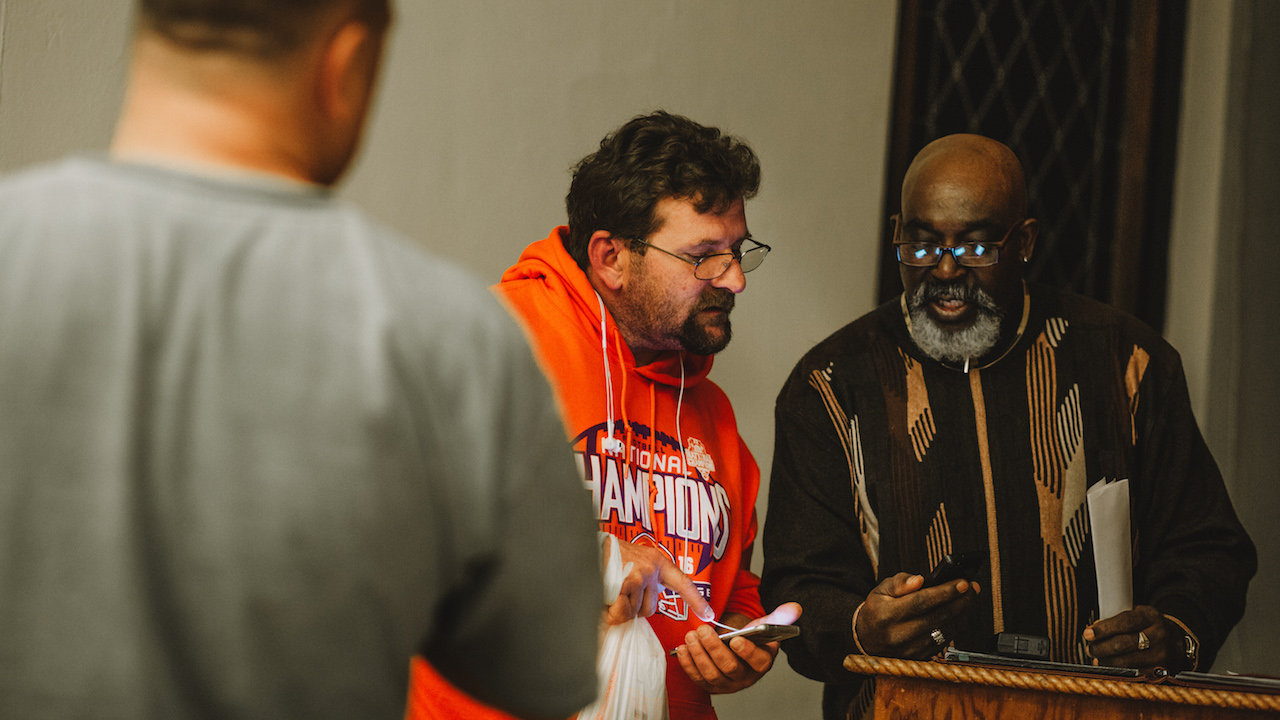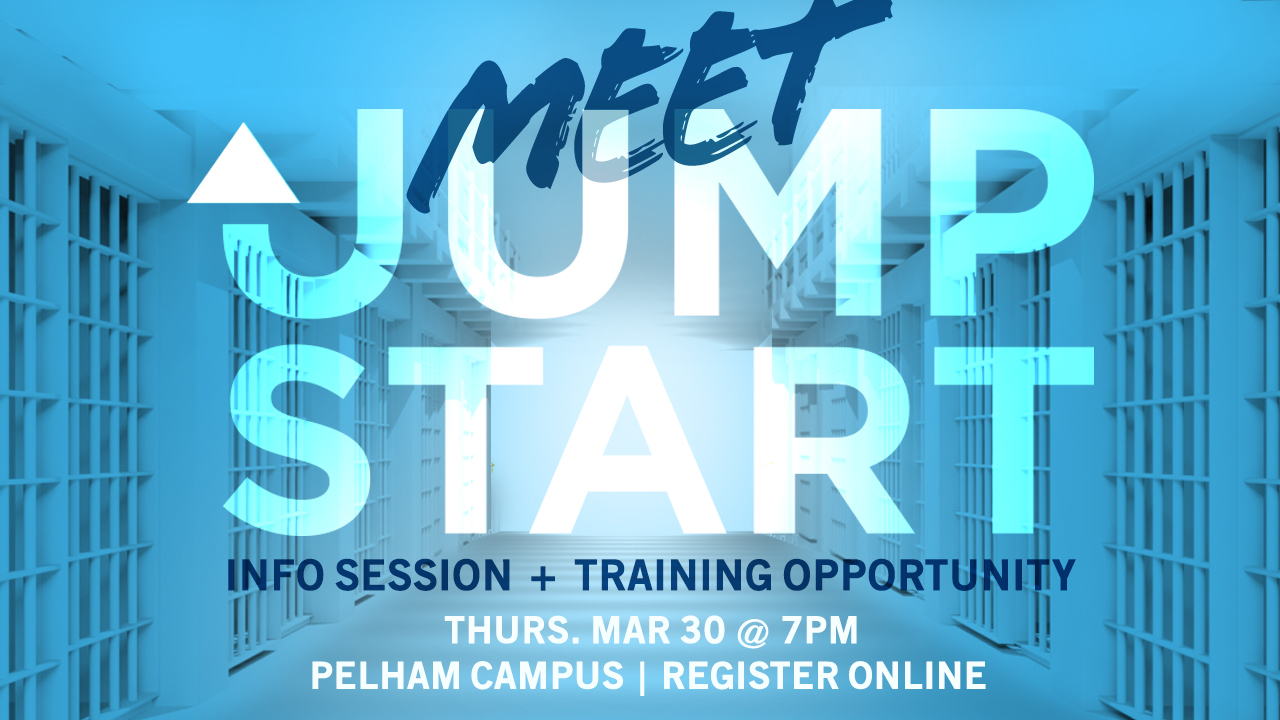
13 Mar I was in prison
Last Friday, I had the privilege to sit in a room with about 45 ex-offenders who had recently been released from prison. Most of them were Christians.
This blog was originally posted in November 2015.
This was my introduction to a ministry to ex-offenders called Jump Start. Members of Jump Start join the inside program while still in prison. When they join, they become part of a community that’s committed to walking with them through the first few years of transition after they are released. Because, whether we realize it or not, being released from prison can be a challenging, and sometimes nearly impossible, transition back into the real world.
Through conversations with people in this ministry, I have learned a few things about the difficulties of reintegrating into society once you’ve served your time. I learned that in the state of South Carolina, you get three things the day you get out: a t-shirt, a pair of khaki pants, and a bus ticket to any city in the state.
I learned that, before you can even get a job, you immediately have debt. If you are on parole or probation, your ankle monitor costs about $120 per month. Child support goes into effect when you get out. You also need a place to live and food to eat, which obviously cost money. I also learned that no one hires you when you check that box on the job application that says, “Have you ever been convicted of a felony?” I learned it is extremely difficult, or nearly impossible, to get reintegrated into society in a healthy way.
No one hires you when you check that box on the job application that says, “Have you ever been convicted of a felony?”
The Bible is full of people who have been in prison–from Joseph in Egypt to John the Baptist, from the prophet Jeremiah to Jesus. But for me, one of the most unnerving passages that speak about prison come from the lips of Jesus in Matthew 25, where he uses ministry to those in prison as a criteria on the day of judgment:
“I was sick and in prison, and you didn’t visit me.’“Then they will reply, ‘Lord, when did we ever see you hungry or thirsty or a stranger or naked or sick or in prison, and not help you?’“And he will answer, ‘I tell you the truth, when you refused to help the least of these my brothers and sisters, you were refusing to help me.’“And they will go away into eternal punishment, but the righteous will go into eternal life.”
The United States contains 5% of the world’s population and 25% of the world’s incarcerated population. As a nation, we put a lot of people behind bars–for a long time.
The leaders at Jump Start informed me that Greenville and Spartanburg lead our state with the highest recidivism rates. They also shared a story of local pastors who rallied together to keep the Jump Start housing program out of their community. This is evidence that even as Christian leaders, sometimes we let our fears and self-protection overshadow mercy and compassion.
The United States contains 5% of the world’s population and 25% of the world’s incarcerated population.
Overall, our justice and legal systems seem to be good at putting offenders behind bars, but it seems we are not doing a great job at getting them re-integrated. Ex-offenders are left to figure it out on their own; because re-integration isn’t easy.
Many of them don’t know where to begin- which is understandable when you see how difficult it is for someone coming out of prison to acquire a practical skill, find employment, secure a place to live, learn how to budget, save money, pay bills, find transportation, and on and on…. For most of them, it’s just easier to commit a crime and go back to the world where they know how to survive.
So what about these ex-offenders who have now become our brothers and sisters in Christ? Do we hold on to our fear and label ourselves as too busy to help? These men and women need the simple support and knowledge that we have to give. Biblical hospitality and mercy aren’t based on the merit of the one receiving; it’s based on the overflow of the one who gives. It’s important for us to remember that we are the same as these individuals released from prison. We are ex-offenders, and we have broken the standards of the only One who can truly hold them. How much more should we welcome and serve the person who is seeking to live a life changed by Christ?
For most of them, it’s just easier to commit a crime and go back to the world where they know how to survive.
As I sat there listening to stories, I couldn’t help but think how much this felt like community group, only without any social pretense. While discussing their small group questions like, “How do you know when you are ready for an opposite sex relationship?” and, “Now that you are out of prison, should anyone be able to give you advice?” I realized the church has a role to play.
This is nuts and bolts discipleship. It’s not complicated; but it requires people who are willing to enter into their lives and offer some guidance along the way. Jump Start begins connecting with and ministering to these folks before they are released, but there is long-term work that needs to be done to help keep someone from going back to prison. When I asked about their biggest need, William Harrison, one of Jump Start’s leaders, answered in one word, “Mentors.”
It’s important for us to remember that we are the same as these individuals released from prison. We are ex-offenders, and we have broken the standards of the only One who can truly hold them.
Several of these men and women I talked to said they had been in prison for 10 years, 17 years, 22 years, one over 30 years. Have you thought about how much the world has changed in 10 years? How much different are things now than 22 years ago? Cell phones, texting, internet, hybrid vehicles, pay at the pump (paying cash for anything these days is rare), filing taxes online, the way we get news, and paying your bills. You name it, and I guarantee it was done differently even just a decade ago.
Mentoring in this context is answering some simple questions, listening, being a resource to help someone navigate some of these issues and encourage them along the way. If you’ve been in prison for a decade or more, how do you so quickly learn to adapt in a society that has completely changed? You will need some help for sure.
I don’t know what all the answers are, but I know the church can help bridge that gap, and in the process, make a big difference. I know Hebrews 13:3 says, “Remember those in prison, as if you were there yourself.”
-Jim Taylor

Join us on March 30 to learn about Jump Start, a prison ministry based in Spartanburg, SC that is committed to changing the lives of inmates so they do not return to prison as second and third time offenders. Through discipleship classes inside 16 South Carolina prisons and a re-entry program currently housing 60 men and women, Jump Start is working to make disciples of Jesus who are equipped to impact the world for Christ.
There will be an informational session for those interested in learning more about the ministry and our partnership. Following the info session, those who wish to serve with Jump Start can attend training a break-out for inside volunteer or outside mentoring.
Pelham Worship Center


